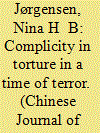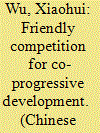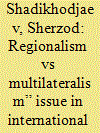| Srl | Item |
| 1 |
ID:
153437


|
|
|
|
|
| Summary/Abstract |
This article examines how the European Court of Human Rights, in three “extraordinary rendition” cases – Al Nashiri, Husayn, and Nasr – has defined the responsibility of complicit States for torture as a human rights violation, seeking to determine the points at which the European Court's jurisprudence intersects with and diverges from other bodies of law, including the general law on State responsibility. Two issues that resonate outside the framework of the European Convention on Human Rights are discussed, namely the application of the subjective knowledge element in respect of the different forms of complicity, and the manner of addressing the role of States that may be considered primarily responsible for torture but that are not parties to the relevant proceedings.
|
|
|
|
|
|
|
|
|
|
|
|
|
|
|
|
| 2 |
ID:
153438


|
|
|
|
|
| Summary/Abstract |
The AIIB is the first major multilateral development bank in a generation and the first multinational institution initiated by China to support regional economic growth and inject new impetus to global governance reform. From the beginning, the AIIB must seek ways to set itself apart from the establishment as represented by the BWIs. This article proposes that the new AIIB break with conventional wisdom and the business as usual of the BWIs and adopt the concept of co-progressiveness for international development. Co-progressive development entails a normative principle that puts self-initiation and external inducement as a means of promoting self-initiated action at the center of international development agendas and programs. As a more proactive and effective system of international development is urgently needed, this article argues that the AIIB and the BWIs should engage in a friendly competition in which players compete for a common goal. Within the AIIB, development strategies, models, policies, as well as expertise and knowledge originating from such developing countries as emerging economies should be given equal or even prioritized consideration, as emerging economies have faced similar challenges and succeeded with innovative solutions. In doing so, the AIIB can lend legitimacy to its international foray, while the global development agenda will be advanced more effectively.
|
|
|
|
|
|
|
|
|
|
|
|
|
|
|
|
| 3 |
ID:
153436


|
|
|
|
|
| Summary/Abstract |
Against the historical background of international criminal justice since the end of World War I, this comment analyzes the obstacles and difficulties faced by the International Criminal Court to establish its legitimacy and authority in the context of global power relations. By reference to the position of the African Union, the systemic crisis of the ICC is highlighted in regard to structural (related to Statute and ratification status) as well as performance-related issues (concerning the investigative and prosecutorial practice in the Court’s 15 years of existence).
|
|
|
|
|
|
|
|
|
|
|
|
|
|
|
|
| 4 |
ID:
153439


|
|
|
|
|
| Summary/Abstract |
This article refutes Eurocentric description of precolonial Africa as stateless, politically unsophisticated and essentially undemarcated. This is despite significant ethnographic and oral histories that suggest the opposite. This position has been challenged by the evidence emanating from recent satellite imagery and orthorectified imagery as well as archaeological studies. These findings, it is argued, provide overwhelming evidence of very precise boundary features and markers separating precolonial African cities, states and political groups. For instance, it has been discovered that between Lake Chad and the Atlantic Ocean, in West Africa, there are about 10,000 town and city walls at least 25% of which are on presently deserted sites. The author helpfully identifies specific aspects of the evidential value of the relict wall discoveries such as in dealing with on-going and future self-determination struggles; resolution of international and national boundary disputes; questions relating to the uti possidetis principle; as well as ongoing debates relating to the legal effects of colonial territorial titles and intertemporal law.
|
|
|
|
|
|
|
|
|
|
|
|
|
|
|
|
| 5 |
ID:
153440


|
|
|
|
|
| Summary/Abstract |
1. On 31 July 2015, the Dispute Settlement Body of the World Trade Organization (WTO) adopted the panel and appellate reports on Peru—Agricultural Products.1 In this dispute, Guatemala challenged additional duties on imports of milk, maize, rice and sugar that Peru had imposed under a so-called “Price Range System” (PRS)—a stabilization mechanism for neutralizing fluctuations of international prices. The PRS enables the Peruvian government to apply variable duties additional to the tariff if the international reference prices for the subject products are lower than certain floor price levels, and tariff rebates if those reference prices are higher than certain ceiling price levels.2 The PRS operates under Supreme Decree No. 115-2001-EF published on 22 June 2001.
|
|
|
|
|
|
|
|
|
|
|
|
|
|
|
|